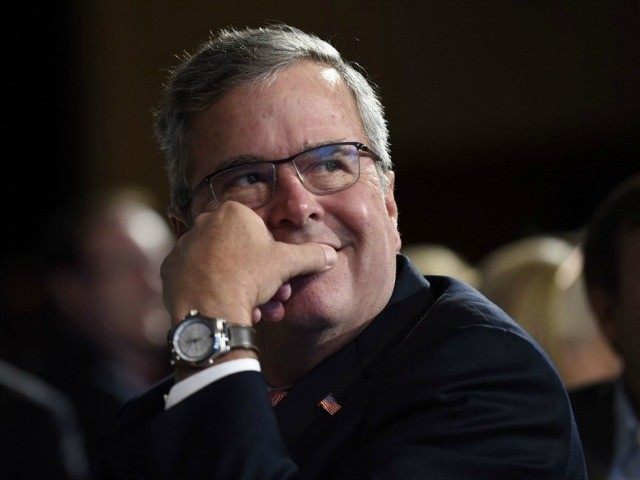A top Jeb Bush ally claims the former Florida governor and potential 2016 presidential candidate is not for “amnesty” for illegal immigrants.
Writing in the Wall Street Journal, a publication that has often demeaned Americans opposed to massive amnesty legislation because of the impact it would have on American workers, Clint Bolick, who co-wrote an immigration book with Bush, argues that conservatives like Rush Limbaugh are only “inciting the inciting the Republican base against [Jeb] by reducing his immigration agenda to a one-word caricature: amnesty.”
“Such critics either don’t understand the meaning of the word amnesty, or they are unfamiliar with Mr. Bush’s positions,” Bolick, who is with a libertarian-leaning think tank, argues. “He has set forth a comprehensive proposal to reform the nation’s immigration policies—and if conservatives get past false depictions and consider his ideas on the merits, they will find much to applaud.”
Bolick claims that because Bush recognizes “that the rule of law requires consequences for illegal actions,” he “proposes that illegal immigrants who came as adults should be subjected to penalties and not be eligible for citizenship.”
When Bush and Bolick came out against full citizenship for illegal immigrants in their 2013 book, Bush’s reversal on the issue, as Bolick notes,”ignited a firestorm among liberals when the book was published.”
And that is when Bush, who would later say that illegal immigration is an “act of love,” started to the clean up the mess, do damage control with the mainstream press, and waffle again on the issue.
On Morning Joe, Bush said: “If you can craft that in law, where you can have a path to citizenship where there isn’t an incentive for people to come illegally, I’m for it. I don’t have a problem with that.”
In an appearance on CNN, he said: “I have supported both–both a path to legalization or a path to citizenship–with the underlying principle being that there should be no incentive for people to come illegally at the expense of coming legally.”
And Bush, along with Bolick, urged House Republicans to vote for the Senate’s “Gang of Eight” comprehensive immigration bill, which included a pathway to citizenship for nearly all of the country’s illegal immigrants, in the very pages of the Wall Street Journal.
Bush has been all over the map on amnesty. At the very least, he has expressed strong support for permanent legal status for illegal immigrants.
In 2012, before his immigration book was published, Bush told Charlie Rose that he was for a pathway to citizenship for illegal immigrants.
“You have to deal with this issue. You can’t ignore it, and so either a path to citizenship, which I would support–and that does put me probably out of the mainstream of most conservatives–or … a path… to residency of some kind,” he said.
But according to Bolick, Bush’s critics are merely “sniping from the sidelines” and “dismissing” his comprehensive immigration reform proposals “with one-word epithets.”
Arguing that Bush is “passionately pro-immigration” in addition to being “passionately pro-rule of law,” Bolick notes that Bush did criticize Obama’s unilateral executive amnesty.
Bolick argues that Bush would push for an increase in high-tech guest-worker visas even though nonpartisan scholars and studies have proven that there is not a shortage of American high-tech workers. He also claims Bush’s immigration proposal “would greatly strengthen border security, linking any legalized status for illegal immigrants to tangible progress on objective border security metrics.” And he touts Bush’s support of a “more robust guest-worker program” that he claims would “ease pressure on illegal immigration.”
Bolick then mentions some features of Bush’s immigration plan that he thinks conservatives will like, such as:
• Requiring fingerprinting all foreign visitors, given that roughly half of all illegal immigrants came to the U.S. legally but overstayed their visas.
• Deploying military resources at the southern border to face down the threat from paramilitaristic Mexican drug cartels.
• Giving states a larger role in policing illegal immigration and flexibility in providing alternatives to federally mandated services such as emergency room treatment for illegal immigrants.
• Patching the loophole in federal law that led to a diaspora of Central American children seeking domicile in the U.S.
• Requiring tougher civics standards for passing the citizenship test—and extending those requirements to all students for high-school graduation.
All of this amounts to “anything but” amnesty, according to Bolick.
“Jeb Bush embraces immigration as the lifeblood of American history and prosperity, and he exhibits compassion even toward those who risk much to come illegally,” Bolick asserts. “But that compassion—a quality that other Republicans could do well to emulate—should not be mistaken for weakness. Mr. Bush believes there is only one proper way to enter the country—through legal means.”

COMMENTS
Please let us know if you're having issues with commenting.